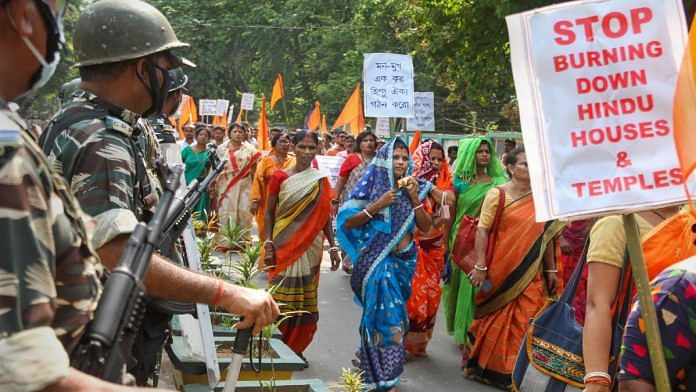New Delhi: The latest episode of communal violence against Hindus in Bangladesh has led to calls that the Muslim-majority country return to the 1972 constitution that envisaged the nation as secular. However, the Sheikh Hasina government believes it will be an “onerous task” to amend the constitution and remove Islam as state religion, sources in the Bangladesh government told ThePrint.
This, despite the fact that Dhaka knows it is important to uphold secular values as Bangladesh stares at unprecedented economic growth.
The move to amend the constitution on such a sensitive topic, the sources said, will give rise to more violence and disrupt the government’s plans to steer the country to growth and development.
Islam was made the state religion of Bangladesh in 1988, when the country was under the rule of the erstwhile military dictator Hussein Muhammad Ershad. His predecessor Ziaur Rahman, another military ruler, is believed to have set in motion the process of Bangladesh’s Islamisation.
However, secularism remains one of the four basic pillars of their constitution as laid out in the preamble, along with nationalism, socialism and democracy.
There have been several reports of violence against the nation’s Hindu minority in Bangladesh. The latest came amid Durga Puja celebrations, with the violence starting on 13 October and continuing in the days afterwards.
Several puja pavilions were vandalised, villages torched, and temples desecrated by religious fundamentalists in a country where over 90 per cent of the population is Muslim.
The Bangladesh government unequivocally condemned the violence, and, as “an immediate measure”, deployed the Bangladesh Border Guard in 22 districts to assist the civilian administration, Bangladesh government sources said.
So far, 71 cases have been filed in connection with the rioting incidents and the prime suspect has been arrested.
The matter of an amendment in the constitution gained prominence earlier this month when Bangladesh’s State Minister of Information Murad Hassan reportedly referred to plans to restore the 1972 constitution, as proposed by their Father of the Nation, Sheikh Mujibur Rehman.
Hassan also said the amendment will be passed without any opposition. However, the ruling Awami League was quick to dismiss Hassan’s remarks. Last week, a party leader said there is “no need” to change the constitution at this moment.
Calls for a constitution that honours secularism have also been made in op-ed pieces, and during protests against the violence.
Also Read: Govt, media, opposition — Bangladesh can teach India how to handle hate crimes
India confident of Hasina govt taking strong action
While the incidents have come as a jolt to the growing bilateral ties between India and Bangladesh, New Delhi believes this is a matter “internal” to their politics, related to their “own citizens”, and the Hasina government is “strong enough” to prevent these incidents. New Delhi knows that this is not the first time such episodes have taken place, sources said.
Official sources told ThePrint that the Indian High Commission in Bangladesh is holding regular conversations with the government there on the matter. It is also in touch with representatives from the minority Hindu community, they added.
However, the sources said Bangladesh needs to take stringent action against religious fundamentalist groups such as the Jamaat-e-Islami and its affiliate Islami Chhatra Shibir that continue to attack the Hindu community there.
On Saturday, addressing an event, Foreign Secretary Harsh Vardhan Shringla said India-Bangladesh relations today are “deeper than any other strategic partnership”, adding that “it is a role model for relations between two neighbouring countries”.
(Edited by Sunanda Ranjan)
Also Read: ‘3,600 attacks since 2013’ — violence against Hindu minority not a first for Bangladesh



